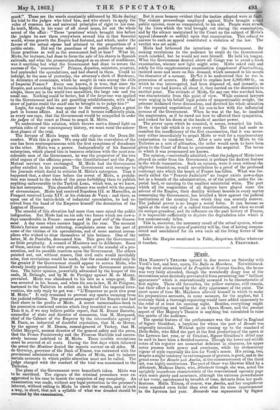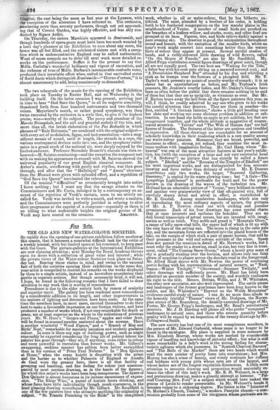HRH MAJESTY'S THELTRE opened in due course on Saturday with
Verdi's last, and best, opera, (In Balk in Mosel:era. Notwithstand- ing the rival attractions of Le Prophete at Covent Garden, the house was very fairly attended, though the wretchedly dingy hue of the decorations most decidedly prevented it from presenting that "brilliant appearance" which is conventionally assumed to be characteristic of first nights. Those old favourites, the yellow curtains, still remain, but their effect is marred by the dirty appearance of the paint. The short space of time Mr. Mapleson allowed himself in which to make his preparations accounts, in some measure, for the neglect, but I certainly think a thorough repainting would have added immensely to the eclat of at least his opening night. Besides, everything ought to be inspiriting and brilliant at an Opera House, and the present aspect of Her Majesty's Theatre is anything but calculated to raise the spirits of the audience.
The special feature of the performance was the de'but in England of Signor Giraldoni, a barytone for whom the part of Renato was originally intended. Without quite coming up to the standard of Delle-Sedie, who filled the part at the first production of the opera at the Lyceum last year, or of Graziani, Signor Giraldoni's debut may be said to have been a decided success. Though the lower and middle notes of his register are somewhat deficient in clearness, his upper notes possess both power and sweetness, while his declamatory vigour of style especially fits him for Verdi's music. His acting, too, despite a slight tendency to extravagance of gesture, is good, and in the grand scena for Renato and Amelia, at the commencement of the third act, was highly meritorious. The part of Oscar was likewise filled by a debutante, Madame Dario, who, debutante though she was, acted the sprightly impudence characteristic of the conventional operatic page with much gaiety and assurance, although the extreme powerfulness of her voice, unredeemed by breadth of tone, detracts from her quali- fications. Mdlle. Titiens, of course, was Amelia, and her magnificent voice sounded even fuller than ever after its close imprisonment in the Lyceum last year. Riccardo was represented by Signor lini, the cast being the same as last year at the Lyceum, with the exception of the alteration I have referred to. The orchestra, numbering more than seventy performers,'though not yet approach- ing that of Covent Garden, was highly effective, and was ably con- ducted by Signor Arditi.
On Thursday, the sisters Marchisio appeared in Semirennide, and though hundreds of opera-goers must have been too much wearied by a hard day's pleasure at the Exhibition to care about any more, the house was all but filled, and the celebrated sisters met with a recep- tion 'which in undemonstrative England may be called enthusiastic. Want of space compels me to defer till next week more detailed re- marks on the performance. Suffice it for the present to say that M dile. Carlotta's wonderful brilliancy and vigour of execution, and the richness of tone of Mdlle. Barbara's incomparable contralto voice, produced their invariable effect when united in that -unrivalled series of florid duets which distinguish Sensir' areide—" Giorno d'orrore," it is almost umiecessary to add, beingunanimously re-demanded.
The two rehearsals of the music for the opening of the Exhibition took place on Tuesday in Exeter Hall, and on Wed Wed nesday in the building itself. On the latter occasion 1 was present, arriving just in time to hear "God Save the Queen," in all its majestic simplicity, thundered forth from four hundred instruments and two thousand voices. Meyerbeer's march, or rather grand symphony, was then twice executed by the orchestra in a style that, to give it the highest praise, was—worthy of its subject. The pomp and grandeur of the Marche Triomphe:le, and the soft and graceful melody of the trio, and, more than all the lavish elaboration of the Pas Redouble in which phrases of "Rule Britannia," are combined with the original subject— , with every act of modulation, fugue, and instrumentation—into a mag- nificent mosaic of sound, until at length, like strandsin a rope, the various contrapuntal devices unite into one, and the symphony culmi- nates in a grand era& of the national air, were deeply enjoyed by the limited audience. Professor Bterndale Bennett's chorale was then re- hearsed—M. Sainton conducting—and the reception the composer met -with on making his appearance to consult with M. Sainton showed the universal popularity of our great English classical composer. 11. Anber's march, overflowing with gaiety and rhythm, was then gone through, and after that the "Hallelujah" and "Amen" choruses from the Messiah were given with splendid effect, and a repetition of "'God Save the Queen" terminated the rehearsal.
Of the musical " difficulties" so prominently brought into notice I know nothing; but I must say that the savage attacks on the Commissioners and Mr. Costa, indulged in by a contemporary on ac- count of the rejection of Verdi's cantata, seem to me utterly un- called for. Verdi was invited to write a march, and wrote a cantata, and the Commissioners were perfectly justified in refusing to alter their programme at the caprice of a composer—especially as there is no telling to what undesirable heights the original genius of M. Verdi may have soared on the occasion. Ammon. "































 Previous page
Previous page